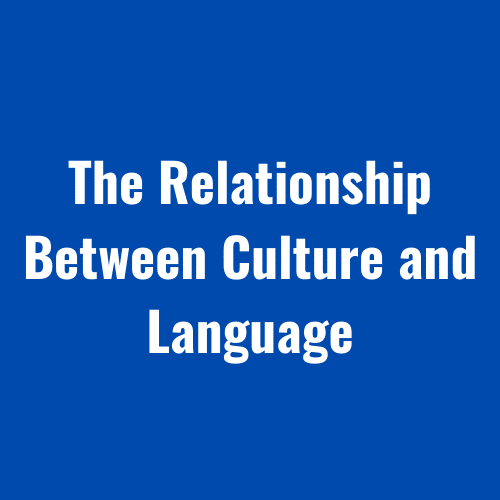Question: The Relationship Between Culture and Language.
Introduction
Culture and language are strongly interconnected. The relationship between culture and language is controversial and when someone tries to understand how language and culture are connected a number of questions come to mind. To understand the relationship between language and culture clearly, it is good to get acquainted with their definitions first.
ভূমিকা: সংস্কৃতি এবং ভাষা দৃঢ়ভাবে পরস্পর সংযুক্ত। সংস্কৃতি এবং ভাষার মধ্যে সম্পর্ক বিতর্কিত এবং যখন কেউ বোঝার চেষ্টা করে কিভাবে ভাষা এবং সংস্কৃতি সংযুক্ত থাকে তখন বেশ কয়েকটি প্রশ্ন মনে আসে। ভাষা এবং সংস্কৃতির মধ্যে সম্পর্ক পরিষ্কারভাবে বোঝার জন্য, প্রথমে তাদের সংজ্ঞাগুলির সাথে পরিচিত হওয়া ভাল।
Definition of culture
Culture is defined as a combination of the type of thought and the characteristics of a group of people. The word culture is derived from the Latin word ‘colere’ which means something born from the earth. So, when people communicate with each other, they fall together which forms their culture. Typically, the term culture is defined using external aspects such as language, traditions, religion, art, and cuisine. But, culture is something deeper than these issues. It refers to the way we think and interact with the people around us.
সংস্কৃতির সংজ্ঞা
সংস্কৃতি সংজ্ঞায়িত করা হয় চিন্তার ধরন এবং মানুব গোষ্ঠীর বৈশিষ্ট্যের সমন্বয়ে। সংস্কৃতি শব্দের উৎপত্তি ল্যাটিন শব্দ ‘কোলেয়ার’ থেকে যার অর্থ পৃথিবী থেকে জন্ম নেওয়া কিছু। সুতরাং, যখন লোকেরা একে অপরের সাথে যোগাযোগ করে, তখন তারা একসাথে বেড়ে ওঠে যা তাদের সংস্কৃতি গঠন করে। সাধারণত, সংস্কৃতি শব্দটি ভাষা, ঐতিহ্য, ধর্ম, শিল্প এবং খাবারের মতো বাহ্যিক দিক ব্যবহার করে সংজ্ঞায়িত করা হয়। কিন্তু, সংস্কৃতি এই বিষয়গুলির চেয়ে গভীর কিছু। এটি আমাদের চারপাশের মানুষের সাথে আমরা যেভাবে চিন্তা করি এবং তার সাথে যোগাযোগ করি তা বোঝায়।
Definition of language
Language is the method of human communication either spoken or written consisting of the use of words in a structured or conventional way.
According to Aristotle, “language reveals speech that humans produce for exchanging their experience resulting in ideas and emotion.
According to Noam Chomsky, “A language means a set of sentences, each finite in length and constructed out of the finite set of elements.
ভাষার সংজ্ঞা
ভাষা হচ্ছে মানুষের যোগাযোগের একটি পদ্ধতি যা কথ্য বা লিখিত হয় যাতে গঠনগত বা প্রচলিত উপায়ে শব্দের ব্যবহার থাকে।
নোয়াম চমস্কির মতে, “একটি ভাষা বাক্যগুলির একটি সমষ্টি, প্রতিটি দৈর্ঘ্য সীমিত এবং উপাদানগুলির সীমাবদ্ধ সেট থেকে নির্মিত।
Evolution of language and culture
Language and culture are constantly changing. For example, the English language we use today is very different from Old English – for example, the ancient form “Maketh” has been changed to “Make”. Similarly, you can identify several differences between the old Western culture and the new culture. No language can exist without culture. Both language and culture experience massive changes over time. Therefore, you cannot expect a 10-year-old child and a 70-year-old man to share the same culture and language though they may live in the same locality.
ভাষা ও সংস্কৃতির বিবর্তন
ভাষা ও সংস্কৃতি প্রতিনিয়ত পরিবর্তিত হচ্ছে। উদাহরণস্বরূপ, আজ আমরা যে ইংরেজি ভাষা ব্যবহার করি তা পুরাতন ইংরেজির থেকে অনেক আলাদা – উদাহরণস্বরূপ, প্রাচীন রূপ “মকেথ” কে “মেক” এ পরিবর্তন করা হয়েছে। একইভাবে, আপনি পুরানো পশ্চিমা সংস্কৃতি এবং নতুন সংস্কৃতির মধ্যে বেশ কয়েকটি পার্থক্য চিহ্নিত করতে পারেন। সংস্কৃতি ছাড়া কোন ভাষার অস্তিত্ব থাকতে পারে না। ভাষা এবং সংস্কৃতি উভয়ই সময়ের সাথে ব্যাপক পরিবর্তন অনুভব করে। অতএব, আপনি 10 বছরের শিশু এবং 70 বছর বয়সী মানুষ একই সংস্কৃতি এবং ভাষা ভাগ করে নেওয়ার আশা করতে পারেন না যদিও তারা একই এলাকায় বাস করতে পারে।
Like ecological balance
A renowned linguist Ken Hale reveals his views on the culture-language relationship. He expresses “When a language is lost, a part of the culture gets lost as well as Culture is significantly encoded in language যখন একটি ভাষা হারিয়ে যায়, সংস্কৃতির একটি অংশ হারিয়ে যায় সেই সাথে সংস্কৃতি উল্লেখযোগ্যভাবে ভাষায় এনকোডেড হয়।” Culture impresses our core traditions, values, and the way we communicate with others in society. On the contrary, language creates those interactions easy. To put it differently, language naturalizes social interactions while culture helps us to learn how to behave and interact with others এটিকে ভিন্নভাবে বলতে গেলে, ভাষা সামাজিক মিথস্ক্রিয়াকে স্বাভাবিক করে তোলে যখন সংস্কৃতি আমাদেরকে কীভাবে আচরণ করতে হয় এবং অন্যদের সাথে যোগাযোগ করতে হয় তা শিখতে সাহায্য করে।
In personality formation
Both language and culture play an important role in shaping human personality. Culture tells us how to communicate with others and helps build values and ethics. Moreover, it keeps us close to like-minded people, and thus, the sense of kinship strengthens our bond with society. On the other hand, language is like a tool that we use to express our culture. Indeed, cultural ideas and beliefs advance through language. Moreover, both culture and language allow us to peek into the past and shape our ideas.
ব্যক্তিত্ব গঠনে
ভাষা এবং সংস্কৃতি উভয়ই মানুষের ব্যক্তিত্ব গঠনে গুরুত্বপূর্ণ ভূমিকা পালন করে। সংস্কৃতি আমাদের বলে কিভাবে অন্যদের সাথে যোগাযোগ করতে হয় এবং মূল্যবোধ এবং নৈতিকতা গড়ে তুলতে সাহায্য করে। অধিকন্তু, এটি আমাদের সমমনা মানুষের কাছাকাছি রাখে এবং এভাবে আত্মীয়তার বোধ সমাজের সাথে আমাদের বন্ধনকে শক্তিশালী করে। অন্যদিকে, ভাষা একটি হাতিয়ারের মতো যা আমরা আমাদের সংস্কৃতিকে প্রকাশ করতে ব্যবহার করি। প্রকৃতপক্ষে, সাংস্কৃতিক ধারণা এবং বিশ্বাস ভাষার মাধ্যমে এগিয়ে যায়। তদুপরি, সংস্কৃতি এবং ভাষা উভয়ই আমাদের অতীতে উঁকি দেওয়ার এবং আমাদের ধারণাগুলি গঠনের অনুমতি দেয়।
Conclusion
Understanding culture can greatly help in learning any foreign language. If one is interested in learning one or more foreign languages, one must study the culture of the region concerned. It is rightly said that ‘action speaks louder than words. Thus, “the more one knows about the cultural background of a language, the faster one can learn that language.”
উপসংহার: সংস্কৃতি বোঝা যেকোন বিদেশী ভাষা শেখার ক্ষেত্রে ব্যাপকভাবে সাহায্য করতে পারে। যদি কেউ এক বা একাধিক বিদেশী ভাষা শিখতে আগ্রহী হয়, তাহলে সংশ্লিষ্ট অঞ্চলের সংস্কৃতি অধ্যয়ন করতে হবে। এটা ঠিক বলা হয়েছে যে ‘অ্যাকশন শব্দের চেয়ে জোরে কথা বলে’। সুতরাং, “একটি ভাষার সাংস্কৃতিক পটভূমি সম্পর্কে যত বেশি কেউ জানবে, তত দ্রুত সে ভাষা শিখতে পারবে।”
